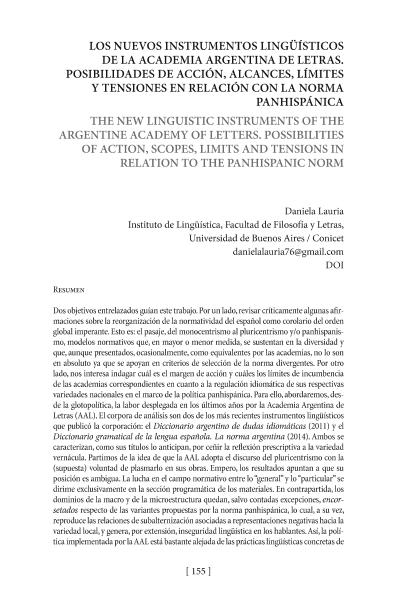Mostrar el registro sencillo del ítem
dc.contributor.author
Lauria, Daniela

dc.date.available
2022-11-08T12:35:58Z
dc.date.issued
2018-07
dc.identifier.citation
Lauria, Daniela; Los nuevos instrumentos lingüísticos de la Academia Argentina de Letras: Posibilidades de acción, alcances, límites y tensiones en relación con la norma panhispánica; Universidad Nacional Autónoma de México; Anuario de Letras. Lingüística y Filología; 6; 1; 7-2018; 155-186
dc.identifier.issn
2448-6418
dc.identifier.uri
http://hdl.handle.net/11336/176842
dc.description.abstract
Dos objetivos entrelazados guían este trabajo. Por un lado, revisar críticamente algunas afirmaciones sobre la reorganización de la normatividad del español como corolario del orden global imperante. Esto es: el pasaje, del monocentrismo al pluricentrismo y/o panhispanismo, modelos normativos que, en mayor o menor medida, se sustentan en la diversidad y que, aunque presentados, ocasionalmente, como equivalentes por las academias, no lo son en absoluto ya que se apoyan en criterios de selección de la norma divergentes. Por otro lado, nos interesa indagar cuál es el margen de acción y cuáles los límites de incumbencia de las academias correspondientes en cuanto a la regulación idiomática de sus respectivas variedades nacionales en el marco de la política panhispánica. Para ello, abordaremos, desde la glotopolítica, la labor desplegada en los últimos años por la Academia Argentina de Letras (AAL). El corpora de análisis son dos de los más recientes instrumentos lingüísticos que publicó la corporación: el Diccionario argentino de dudas idiomáticas (2011) y el Diccionario gramatical de la lengua española. La norma argentina (2014). Ambos se caracterizan, como sus títulos lo anticipan, por ceñir la reflexión prescriptiva a la variedad vernácula. Partimos de la idea de que la AAL adopta el discurso del pluricentrismo con la (supuesta) voluntad de plasmarlo en sus obras. Empero, los resultados apuntan a que su posición es ambigua. La lucha en el campo normativo entre lo general y lo particular se dirime exclusivamente en la sección programática de los materiales. En contrapartida, los dominios de la macro y de la microestructura quedan, salvo contadas excepciones, encorsetados respecto de las variantes propuestas por la norma panhispánica, lo cual, a su vez, reproduce las relaciones de subalternización asociadas a representaciones negativas hacia la variedad local, y genera, por extensión, inseguridad lingüística en los hablantes. Así, la política implementada por la AAL está bastante alejada de las prácticas lingüísticas concretas de los argentinos y es funcional al mantenimiento de la desigualdad lingüística, pese al hecho, no menor, de que subsiste gracias al financiamiento estatal por vía del Ministerio de Ciencia, Tecnología e Innovación Productiva de la Nación.
dc.description.abstract
Two intertwined objectives guide this work. On the one hand, we review critically some statements about the reorganization of the norms of Spanish as a corollary of the prevailing global order. This is: the passage from monocentrism to pluricentrism and / or Panhispanism, normative models that, to a greater or lesser extent, are based on diversity and which, although occasionally presented as equivalent by the academies, are not at all already because they are based on divergent standard selection criteria. On the other hand, we are interested in investigating the scope of action and what the limits of responsibility of the corresponding academies in terms of the language regulation of their respective national varieties within the framework of Pan-Hispanic policy. For this, we will approach, from the glottopolitical point of view, the work develop in the last years by the Argentine Academy of Letters (AAL). The corpora are two of the most recent linguistic instruments published by the corporation: the Argentine Dictionary of Idiomatic Doubts (2011) and the Grammatical Dictionary of the Spanish Language. The Argentine norm (2014). Both are characterized, as their titles anticipate, by tightening the prescriptive reflection to the vernacular variety. We start from the idea that the AAL adopts the discourse of pluricentrism with the (supposed) will to translate it into his works. However, the results suggest that his position is in a dilemma. The struggle in the normative field between the “general” and the “particular” was exclusively addressed in the programmatic section of the materials. On the other hand, the macro and microstructure domains are, with few exceptions, limited in relation to the variants proposed by the Panhispanic norm, which, in turn, reproduces the relations of subalternization associated with negative representations towards the local variety, And generates, by extension, linguistic insecurity in the speakers. Thus, the policy implemented by the AAL is far removed from the specific linguistic practices of the Argentines and is functional to the maintenance of linguistic inequality, despite the fact, not less, that it subsists thanks to state funding through the Ministry of Science, Technology and Productive Innovation of the Nation.
dc.format
application/pdf
dc.language.iso
spa
dc.publisher
Universidad Nacional Autónoma de México

dc.rights
info:eu-repo/semantics/openAccess
dc.rights.uri
https://creativecommons.org/licenses/by-nc-sa/2.5/ar/
dc.subject
ACADEMIA ARGENTINA DE LETRAS
dc.subject
INSTRUMENTOS LINGÜÍSTICOS
dc.subject
NORMA ARGENTINA
dc.subject
PLURICENTRISMO / PANHISPANISMO
dc.subject.classification
Lingüística

dc.subject.classification
Lengua y Literatura

dc.subject.classification
HUMANIDADES

dc.title
Los nuevos instrumentos lingüísticos de la Academia Argentina de Letras: Posibilidades de acción, alcances, límites y tensiones en relación con la norma panhispánica
dc.title
The new linguistic instruments of the argentine academy of letters: possibilities of action, scopes, limits and tensions in relation to the panhispanic norm
dc.type
info:eu-repo/semantics/article
dc.type
info:ar-repo/semantics/artículo
dc.type
info:eu-repo/semantics/publishedVersion
dc.date.updated
2022-11-07T15:38:38Z
dc.journal.volume
6
dc.journal.number
1
dc.journal.pagination
155-186
dc.journal.pais
México

dc.journal.ciudad
México DF
dc.description.fil
Fil: Lauria, Daniela. Universidad de Buenos Aires. Facultad de Filosofía y Letras. Instituto de Lingüística; Argentina. Consejo Nacional de Investigaciones Científicas y Técnicas; Argentina
dc.journal.title
Anuario de Letras. Lingüística y Filología
dc.relation.alternativeid
info:eu-repo/semantics/altIdentifier/url/https://revistas-filologicas.unam.mx/anuario-letras/index.php/al/article/view/1480
Archivos asociados
